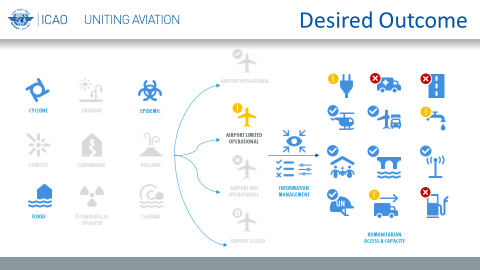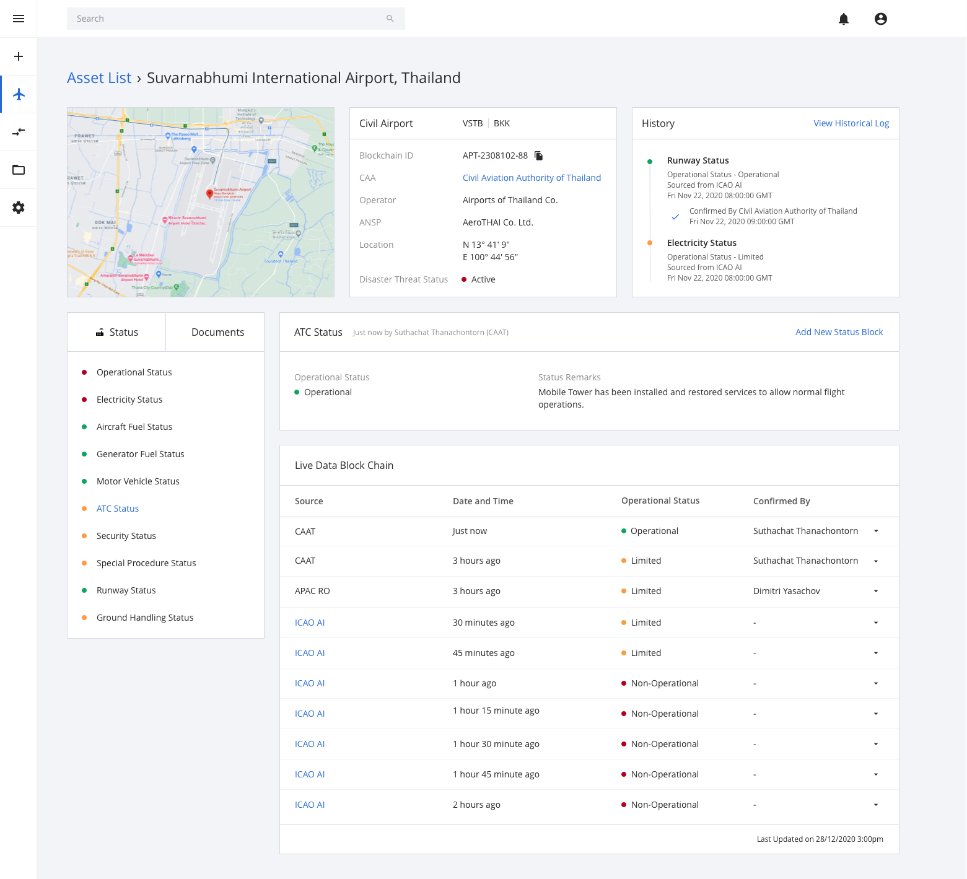In the aftermath of a disaster, aviation constitutes an essential lifeline for the people affected. The efficient arrival of life-saving equipment, supplies, and humanitarian experts is critical in the first hours and until the start of the recovery phase which takes place one to three weeks after the event strikes. For the third consecutive year, ICAO participated in the Humanitarian and Partnerships Week (HNPW) that was held virtually from 19 April to 7 May 2021 and co-hosted by the United Nations Office for the Coordination of Humanitarian Affairs (OCHA) and by the Swiss Agency for Development and Cooperation (SDC).
 This year’s edition of the HNPW involved 232 sessions organized by networks of humanitarian partners dealing with various aspects of humanitarian response, including the Humanitarian Assistance and Disaster Response in Aviation (HADRA) Expert Group, chaired by ICAO. The HADRA Expert Group focused its attention on discussing key challenges and agreeing to develop new cooperative strategies to respond effectively and efficiently after disaster strikes.
This year’s edition of the HNPW involved 232 sessions organized by networks of humanitarian partners dealing with various aspects of humanitarian response, including the Humanitarian Assistance and Disaster Response in Aviation (HADRA) Expert Group, chaired by ICAO. The HADRA Expert Group focused its attention on discussing key challenges and agreeing to develop new cooperative strategies to respond effectively and efficiently after disaster strikes.
Responding effectively to disasters
During crisis response, the high volume of air traffic can quickly overwhelm an airport’s capacity and push its infrastructure to the limits. In many disaster scenarios, air traffic control systems may be degraded, thereby limiting the ability to receive the necessary humanitarian relief items and teams. An airport operator may have to accommodate aircraft types that do not normally operate at the airport, and it may also have to handle mixed traffic (commercial, military and humanitarian), which poses questions of how to allocate scare physical and human resources, as well as essential services, such as ground handling, refueling, and aircraft maintenance.
As illustrated during the COVID-19 pandemic, new challenges affecting the provision of relief operations stem from public health concerns: aircraft operating restrictions, new arrival protocols, quarantines, and other health protocols can impact humanitarian response to a crisis. All of these challenges were raised and then discussed by the HADRA Expert Group.
 ICAO serves as the chair of the HADRA Experts Group. Since February 2021, the group has been working alongside the technology firm Block Aero to implement a blockchain technology tool that will allow the humanitarian and aviation stakeholders to have access to timely and reliable information critical to crisis planning and response. Such information is typically disseminated by OCHA to its partners (see the chart to the left). This communication tool may also have the effect of prompting a discussion among the various entities and relevant agencies involved in the implementation of emergency response plans at the national level.
ICAO serves as the chair of the HADRA Experts Group. Since February 2021, the group has been working alongside the technology firm Block Aero to implement a blockchain technology tool that will allow the humanitarian and aviation stakeholders to have access to timely and reliable information critical to crisis planning and response. Such information is typically disseminated by OCHA to its partners (see the chart to the left). This communication tool may also have the effect of prompting a discussion among the various entities and relevant agencies involved in the implementation of emergency response plans at the national level.
The objective of the HADRA is to enhance the preparedness and response capabilities of States, aviation stakeholders, and humanitarian stakeholders in the event of a disaster. The activities the group undertakes are intended to incentivize the integration of airport preparedness in countries’ disaster preparedness planning and other sectoral programs of relevance. It also contributes to the 2030 agenda for Sustainable Development (SDGs 1, 2, 3, 4, 6, 9 and 11), to the Sendai Framework for Disaster Risk Reduction, to the SAMOA Pathway and to the UN Common Agenda. This work is fully aligned with ICAO Assembly Resolution A39-24, Strategy on Disaster Risk Reduction and Response Mechanisms in Aviation, and with the ICAO Crisis Response Policy adopted in 2017.
A key lesson from the 2021 HNPW: the importance of partnerships
The HADRA Expert Group membership is comprised of ICAO, Airports Council International (ACI), Civil Air Navigation Services Organization (CANSO), Deutsche Post DHL (DP-DHL), Global Logistics Cluster (GCL), International Air Transport Association (IATA), OCHA, United Nations Development Programme (UNDP) and the World Food Programme (WFP).
All members bring their perspectives on the challenges faced during disaster response operations. The diversity of expertise in the group increases mutual understanding and throws light on not yet unveiled constraints, which was evidenced during the HADRA session at the HNPW, when ACI, IATA and DP-DHL were invited to share their perspectives.
One of the key messages from the 2021 HNPW session of HADRA was the need for creating the right environment to collaborate, given that it would enable the understanding of your/your partners’ respective roles. Though planning should result from this collaboration, effective planning cannot be considered without actual implementation training. This training component is all the more important given how the operating environment in the aftermath of disasters grows in complexity. Last but not least, a strong emphasis was put on the fact that aviation is a system and one of the keys to enhanced response involves the enhanced resilience of the aviation system as a whole. In that, the training programme “Get Airports Ready for Disaster” managed by DP-DHL and supported by UNDP provides a concrete opportunity to gather major stakeholders around the table at each airport and to assess their strengths and vulnerabilities to work towards an effective response plan.
The way forward
The HADRA Expert Group will continue to implement its work plan, which will incorporate the development and implementation of the blockchain tool and associated guidance material, by the end of 2021. In the coming weeks, the blockchain tool will be tested in the ICAO Regional Office for Latin America and the Caribbean and we are looking forward to collecting the lessons learned (mock-up view of the Airport Status Information Tool shared below).
About the Contributors
Mrs. Chrystelle Damar, Strategic Planning and Regional Coordination Officer (Strategic Planning and Regional Coordination Office) and Chair of the HADRA Expert Group
Mr. Romulo Gallegos, Senior Officer, Partnerships and Resource Mobilization (Strategic Planning and Regional Coordination Office)
Mr. Anton Kornetskiy, Project Support Officer, Programme Coordination and Implementation (PCI) Section, Air Navigation Bureau (ANB)



